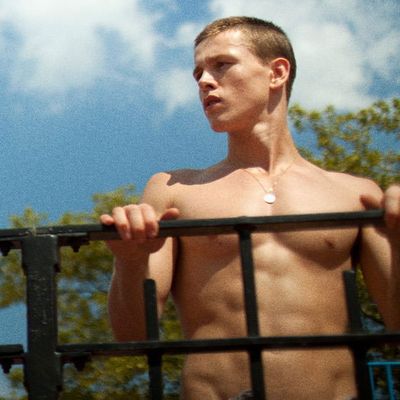
I’ve been thinking a lot this summer about the appeal of the beach, the privilege of the beach, and the freedom of the beach. Characters in movies head to the beach to break free of their worlds and have revelations (this year’s Oscar winner Moonlight is a particularly indelible example of that tradition). It’s the end of the world for all practical purposes, even now that we (most of us) know that the Earth isn’t flat. The beach is romantic because of its blankness, its lack of structure; the comparatively alien nature of the land tells us that the normal rules of society might not apply here. The vastness of the ocean makes us feel small, but in that smallness might come liberation.
But there’s certainly a spectrum between, say, the seemingly endless sandy expanses on the coast of Southern California and Coney Island, a beach so thoroughly colonized that it’s become a sort of society of its own. It serves as the backdrop for Eliza Hittman’s Beach Rats, and through the eyes of her protagonist, Frankie (newcomer Harris Dickinson), it’s a young-adult wasteland, a gossipy, soda-pop-and-oxys hive with its own social conventions and norms. For Frankie, it’s suffocating, and when a pretty young thing (Madeline Weinstein) tries to create a moment with him under the fireworks, he goes cold. Whatever liberation this girl — as well as his crew of gangly bros — are deriving from the deep Brooklyn summer, he isn’t able to access.
Frankie is questioning his sexuality, and by the time we meet him he’s already discovered a different kind of anonymous liberation: A gay cam site where he chats with and awkwardly stares at men of all ages and shapes, slack-jawed, actively trying to figure out what he’s feeling in the glow of his computer screen. When he does eventually start meeting up with them, he insists he’s not gay. It’s already a tumultuous summer for him: His father is dying of cancer, and his home is shadowy and cold, as if already anticipating the loss to come. Hittman makes us understand all the stress and grief and horniness holistically. When he eventually starts dating the girl from the beach, he’s about as emotionally available as one would expect.
Like Frankie, Beach Rats is short on words, and the nature of the dialogue we do get made me wish we were even a little bit shorter on them. It’s a film about a young man who has lost his father, isn’t sure what he wants out of adulthood, and who has come of age in a milieu that hasn’t given him the faculties to express and deal with the emotions he’s feeling. The film is at its best when it lets Dickinson’s deceptively blank face and Hélène Louvart’s lyrically natural cinematography tell the story, which is far more informed by mood than events. In fact, when a particularly plotty twist rears its head right at the third-act line, I was a bit taken out of the film, not least because it was incredibly unbelievable.
Still, Hittman’s skill as an impressionistic filmmaker, giving us enough glimpses that we can fill in the whole, makes for an incredibly engaging viewing experience. Like Frankie, it’s not that interested in big explosions, or a grand finale. But Frankie keeps a looping video of the fireworks as the screen saver for his secret-filled computer, and it feels like a wistful kind of vision-boarding, imagining a day when he’ll feel what everyone else feels when they look up at the explosions on a warm night at the beach.

